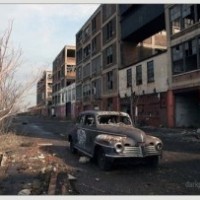
Baton Rouge’s Stagnant Population Growth Sends Warning: Don’t Follow Path of Detroit
It’s not very popular and certainly not politically correct to talk about the problems in your own community. But if we aren’t honest with ourselves, the consequences will be very grave indeed.
Despite all the hoopla and Chamber of Commerce rhetoric, this parish and this city are so close to tipping over the edge and becoming another New Orleans or even Detroit that it’s not even funny.
Families have been fleeing East Baton Rouge Parish and especially the City of Baton Rouge for 30 years now.
Fewer and fewer families with children live here.
Population growth in the City of Baton Rouge is nil, and population growth in East Baton Rouge is the worst it’s been in 200 years.
Look at the population growth in East Baton Rouge Parish in the 1940’s and 1950’s. We averaged from 4.5 to 7.9 percent growth annually! It was a boom time, and new construction and jobs were everywhere.
But by the late 1970’s, we had killed the goose that laid the golden egg. Good public schools with high academic standards and strong discipline in the classroom became a thing of the past. Growing crime left citizens living in fear behind locked doors and barred windows.
Not integration but cross-town busing led to a mass exodus from public schools by most white families with children and an increasing number of black families.
As crime rates rose, people stopped going out so much, they didn’t know their neighbors as much, and we began to lose the sense of community.
Today, Baton Rouge is a collection of people, mostly good people, who no longer know one another. The sense of community that we once shared is largely gone.
Now there is so much distrust and fear. Where I live, there is hardly a week that goes by that I don’t hear gunshots. Sometimes it’s multiple times during one night.
Meanwhile, our neighbors in Livingston and Ascension are now booming. Within East Baton Rouge Parish, Zachary and Central are booming. Where there are good public schools and low crime rates, there is growth, prosperity, and also something even more important — a sense of community.
Where there are good public schools, people send their children to public schools, and parents get to know each other. They have the sense that we’re all in this together.
In Baton Rouge, our days are numbered. What is wrong here is epitomized by our failing parish public school system, which adamantly refuses to reform itself. What is wrong here is also epitomized by the CATS board and the recent CATS tax.
Urban socialism is taking hold.
We saw where things are going in the election results in 2012, with Obama carrying East Baton Rouge Parish by over 10,000 votes. This was at the same time that Romney carried Louisiana in a landslide.
The greatest hope we have going in this parish right now is the citizen-led movement in Southeast Baton Rouge. Local Schools for Local Children, led by Norman Browning, is offering a large part of this parish the opportunity to start its own independent school district, just as Zachary and Central have successfully done. Now his group is also considering attempting to incorporate Southeast Baton Rouge as a city.
To me, this is the most encouraging thing happening in our parish. For 100,000 or more of our residents, it would mean a return to neighborhood schools and, in all likelihood, a strong bulwark against crime. The creation of the Southeast Baton Rouge School District and the incorporation of that new city would send a strong message that we’ve had enough and the tide has turned. That would be cause for great hope and optimism.
Population
City of Baton Rouge
30 years of
No Population Growth
Year Total
1960 152,419
1970 165,963
1980 219,419
1990 219,531
2000 227,818
2010 229,493
Population Growth
East Baton Rouge Parish
— Boom to Bust —
Last 30 years
Worst Growth in 200 Years
Census Population Growth %
1810 1,468 N/A
1820 5,220 255.6%
1830 6,698 28.3%
1840 8,133 21.4%
1850 11,977 47.3%
1860 16,046 34.0%
1870 17,816 11.0%
1880 19,966 12.1%
1890 25,922 29.8%
1900 31,153 20.2%
1910 34,580 11.0%
1920 44,513 28.7%
1930 68,208 53.2%
1940 88,415 29.6%
1950 158,236 79.0%
1960 230,058 45.4%
1970 285,167 24.0%
1980 366,191 28.4%
1990 380,105 3.8%
2000 412,852 8.6%
2010 440,171 6.6%


 July 29, 2013
July 29, 2013 







No comments yet... Be the first to leave a reply!